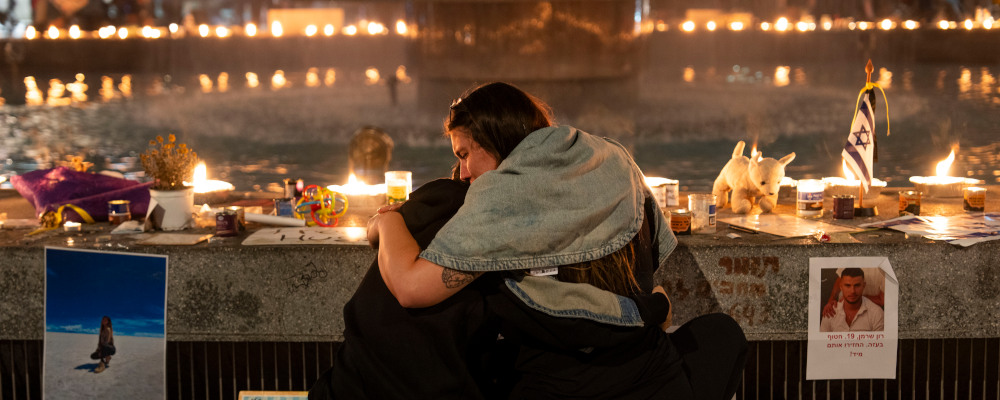Arriving from Israel on a cold Sunday morning, eight family members of Jewish hostages currently held prisoner by the Hamas terrorist group in the Gaza Strip came to Ottawa to share their story and plead for Canadian support.
They visited Canada from October 29-31, just weeks after the Hamas terrorists murdered 1,200 Jews during a kill-and-capture raid against Israel on October 7. They met with politicians, spoke to the media, and appealed to ordinary citizens with one united message: “Don’t forget our stories. Bring our families home.”
To those of us who spent time with these family members of the hostages, their stories did indeed become more vivid and real. Not social media abstractions but living human tragedies told by people longing to be able to hug their mothers, their nephews, their nieces, their uncles, and their aunts again.
There was the story of Sapir, told by her family member Alexandra. Sapir had traveled to spend the Sabbath with her husband Alexander’s family at Kibbutz Nir Oz. Alexander’s father, Vitaly, 50, was murdered, while his mother Elena, 50, and grandmother Irina Tati, 73, were taken to Gaza as hostages. Aviv and Alexandra then learned of Sapir’s captivity by seeing a TikTok video of her paraded through the streets of Gaza, spit upon, beaten, and horrified.
Then there is Aharon, who spoke so beautifully about his sister-in-law, Hagit, and her kindness, and the summer he spent with her and her children, Ofri, 10, Yuval, 8, and Uriah, 4, in Toronto. On October 7th all 4 were kidnapped from their home in Kibbutz Kfar Aza and taken to Gaza.
Itay and his mother Merav came to Ottawa to speak for her uncle and aunt, Avraham and Rute Munder, both of them 78 years old, who were kidnapped by Hamas terrorists along with their daughter Keren Munder, 54, and her son Ohad Munder Zichri. Ohad turned 9 while in captivity, rather than celebrating with his friends and family over a birthday cake, he is being held in cruel captivity.
Harel came to share the story of his niece Tiferet Lapidot. On October 7th, like any normal 22-year-old, Tiferet went to dance at the Nova music festival, before it turned into a site for terror and mass murder. Tiferet was murdered by Hamas terrorists at the Nova music festival where more than 260 innocent people were slaughtered.
And finally, there was Chen. Chen came to raise awareness about his mother Vivian Silver. Vivian was a Canadian, who moved to live at Kibbutz Be’eri where she built a beautiful life. She was a leader in the peace movement, committed to bringing unity to Israelis and Palestinians. On November 13th, Vivian was officially declared amongst the dead rather than missing. Listening to her son speak about her in the news conference, you learned about a woman who was full of light and kindness. Vivian devoted her life to the peace movement, building real and everlasting relationships with Palestinians in Gaza. It took five weeks to identify her body amongst the ruins of Kibbutz Be’eri, symbolizing the immense devastation caused by Hamas.
And yet amid the suffering, while listening to these stories, I felt ensconced by two emotions that seemed to be held by every single person present, Jew or non-Jew. Love: the kind of love we forget to feel so much of the time but streams powerfully from our hearts when our deepest sense of humanity is impacted. And will: Israel’s iron will to survive. To fight, win, and thrive.
In the spring of each year, Jews around the world gather at the Passover table for Seder supper and recount the story of the Israelites’ exodus from Egypt. Through joy and song we remember that once we were slaves—without rights, without land—but now we are free, with our ancestral homeland in our permanent possession.
After spending precious, terrible moments with those whose loved ones are being held captive by the Hamas in Gaza, I also couldn’t help but reflect on the Seder meals I’m so grateful to have had and that I look forward to with my family.

The Haggada, the Jewish text that governs the Seder meal, gives considerable space to the hardships our ancestors faced—the bricks, the mortars, and the tears. It’s how we mourn and make meaning from our people’s suffering.
The next Seder, in Spring 2024, will become vividly and tragically personal for the Jewish community around the world as we meditate upon my people’s suffering and the meaning we make of it in moments of triumph, and in our stubborn refusal to be bullied, smeared, and eradicated.
The Jews’ exodus from Egypt began with four simple words from Moses: “Let my people go.”
Today, that message is directed to the terrorist cowards hiding behind 239 Jewish hostages—and, let’s not forget, innocent Palestinian civilians—as they rain rockets down on the world’s first and only Jewish State.
Moses got his people back. And so will we.
Recommended for You

Peter Menzies: Justin Trudeau’s legislative legacy is still haunting the Liberals

Need to Know: Mark Carney’s digital services tax disaster

‘Putin has no intention of stopping this war’: Sir Bill Browder on three years of war in Ukraine and how Russia is evading sanctions

Alan Kessel: Genocide, weaponized: How a legal term became a political bludgeon



